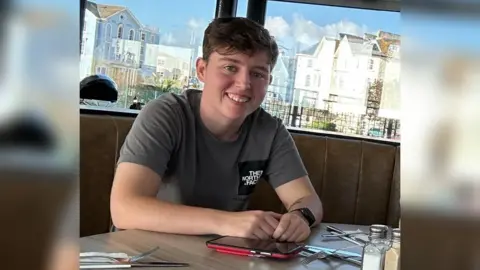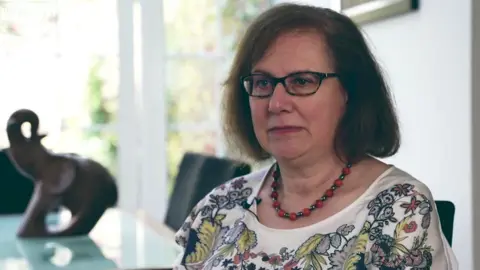Gender care review disappointing, says trans man
 Sarah Donovan
Sarah Donovan Trans young people say they feel "disappointed" and "ignored" by the Cass Review into gender care.
One man, 19, who was part of the review's focus groups, said the positive lived experiences of trans children who had been able to access puberty blockers was not included in the report.
The review was commissioned by NHS England in 2020 after a sharp rise in the number of patients referred to the NHS who were questioning their gender.
The Cass Review said it hoped the "holistic approach" set out in the report can support all young people "to get on the right pathway for them".
After a four-year wait, the Cass Review was published on 10 April following an interim report in 2022.
The 388-page report said there was "weak evidence" surrounding gender care and suggested "extreme caution" when prescribing puberty blockers or masculinising or feminising hormones in the form of testosterone or oestrogen.
Puberty suppressing hormones - more commonly known as puberty blockers - work by inhibiting the release of hormones that cause puberty.
They are often prescribed to children questioning their gender as a way of stopping physical changes such as breast development or facial hair.
The review analysed NHS England - a service which many Welsh children will have used as there is no service in Wales.
'Not listened to'
Sean Donovan was 14 when he knew he had gender dysphoria, but was not able to access puberty blockers which he said could have saved him "so much trauma".
Over the past four years he has been involved in the focus groups for the review, but said: "I was actually surprised at how much of the discussions we had didn't seem to translate into [the report].”
Now 19, Mr Donovan from Caerphilly said: "It took a lot of time and energy to share in that experience, and then it's kind of come out, and that's not being fully listened to."
When reading it, he said there was "positive stuff" such as trans children being supported with their transition, which is "contrary to the school guidance".
But he said there was a lot he "didn't resonate with at all".
Mr Donovan said the report “pushed too hard” on mental health.
“It makes trans children out to be these traumatised kids when that’s not the case at all. Some of the time it is, but not for all.”
 Reuters
ReutersThe review recommended a "holistic assessment" of a child's needs, including "screening for neurodevelopmental conditions, including autism spectrum disorder, and a mental health assessment".
Mr Donovan said none of this would have helped him, he just needed transition support.
“There's very little in [the report] about how to support trans kids. It's all about how do we identify if they're really trans," he said.
“It medicalises the process, it makes trans children out to have something wrong with them that needs to be solved.”
He said he also felt the review avoided "affirming trans identities" through its use of language, using 'children with gender dysphoria' over 'transgender children'.
He added the review implied trans children were "unstable" and don't "know themselves".
 Sarah Donovan
Sarah DonovanHe previously said he had to access treatment privately because of the long wait on the NHS.
"If I didn't do anything I knew I wouldn't be able to stay well mentally," he said.
"I wasn't thinking about my future - there was no future."
Mr Donovan said: "Trans people and trans children have always existed so this may feel really big and scary at the moment but we're not going to disappear overnight because some clinicians have said we’re mentally ill and aren’t real.
"There’s always going to be trans people, it’s just keeping going and making sure those people hear us - making sure we’re loud."
 Liz Castleman
Liz CastlemanGwion Williams, 20, from Bridgend, also felt "ignored" and "failed" by the review.
He said the review's focus on mental health "in theory sounds like a wonderful idea where we're looking at the person as a whole and making sure that they get the treatment they need".
"Instead, it is just going to be used as an excuse, as it already is to explain away the experiences and feelings or dismiss underlying issues of gender dysphoria," he said.
"The assumption is that there is probably just mental health underpinning it, and we can fix that instead, you'll be fine," he said.
"I found that when I was referred there I was laughed at and told I couldn't possibly be trans."
When reading the review he said he saw no explanation of how holistic support would work, "other than searching for other diagnosis".
In 2022 the review published an interim report which paused the prescription of puberty blockers for all trans children, except for those taking part in clinical research.
Mr Williams said this had "negatively impacted trans youth", with fewer than 100 people being able to access puberty blockers last year.
While the review said providing masculinising and feminising hormones from age 16 "is available", their recommendation would be "an extremely cautious clinical approach and a strong clinical rationale for providing hormones before the age of 18".
Mr Williams said: "Personally, I really wish I had had access to puberty blockers. because now I'm awaiting top surgery and having to undergo bigger life changes because I was not given that time to think these things through.
"While studies have not been able to find an overall benefit as of yet, because studies have been limited within trans healthcare, it also did not find any negatives to the mental health of trans children."
 John Dunkley-Williams
John Dunkley-WilliamsRocio Cifuentes, the children's commissioner for Wales, said: “I will carefully consider the points raised in this significant and long-awaited review.
"I'll be asking the Welsh government how the review's findings will affect their actions in Wales, and how they will reflect on the UN Committee on the Rights of the Child's concluding observations on this issue.”
The Cass Review said it heard from many gender diverse, trans and non-binary young people who had "a range of hopes and needs and wanted different things from the service".
"The Review hopes that in providing the holistic approach described in the report, across a greater number of services, the NHS can support all those presenting, including young people like Sean and Gwion, to get on the right pathway for them to thrive as individuals," it added.
The Welsh government said it was "committed to improving the Gender Identity Development pathway and the support available for young people in Wales, in line with the commitments in our LGBTQ plan".
It added it will consider the review's findings to provide support for young people questioning their gender.
